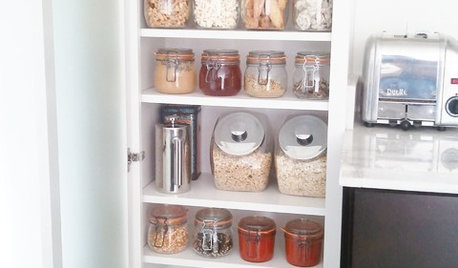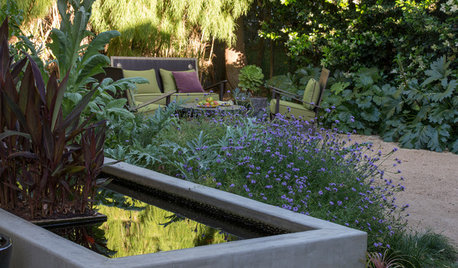Help me adopt a fertilizer regimen
igrowindoors
14 years ago
Related Stories

GARDENING GUIDESHow to Switch to an Organic Landscape Plan
Ditch the chemicals for a naturally beautiful lawn and garden, using living fertilizers and other nontoxic treatments
Full Story
HOUSEPLANTSHow to Create an Indoor Landscape
Apply principles and elements of design to help your indoor garden flourish
Full Story
KITCHEN DESIGNDesign an Easy-Clean Kitchen
"You cook and I'll clean" might no longer be a fair trade with these ideas for low-maintenance kitchen countertops, cabinets and floors
Full Story
SMALL HOMESHouzz Tour: Rolling With Simplicity in a Tiny House on Wheels
Just 240 square feet, this California home encourages efficient living — but there’s still room for yoga
Full Story
HEALTHY HOME6 Tips From a Nearly Zero-Waste Home
Lower your trash output and increase your quality of life with these ideas from a mom who did it to the max
Full Story
HOMES AROUND THE WORLDHousehold Habits and Customs to Borrow From Other Countries
Discover why salt may be the perfect house-warming gift, how to clean rugs in snow and why you should invest in a pair of ‘toilet slippers’
Full Story
MOST POPULARMy Houzz: Open-Air Living in the Mountains of Bali
Community, jaw-dropping beauty and sustainability come together in a tropical paradise for a London expat
Full Story
SAVING WATERHouzz Call: Are You Letting Go of Your Lawn?
Many facing a drought are swapping turf for less thirsty plantings. If you’re one of them, we’d like to hear about it
Full Story
LANDSCAPE DESIGNEasy Ways to Manage Stormwater for Lower Bills and a Healthier Earth
Send cleaner runoff into local waterways and spend less on yard irrigation with these simple landscaping approaches
Full Story
KITCHEN WORKBOOK8 Kitchen Amenities You'll Really Wish You Had
Keep kitchen mayhem and muck to a minimum with these terrific organizers and other time-saving, mess-preventing features
Full Story



tapla (mid-Michigan, USDA z5b-6a)
tn_veggie_gardner
Related Discussions
Best fertilizer regimen for Meyer
Q
Starting a Fertilizing Regimen
Q
Regimen for my LITTLE Honey Hydrangea
Q
Lawn Spring Up Regimen
Q
igrowindoorsOriginal Author
penfold2
igrowindoorsOriginal Author
meyermike_1micha
calistoga_al ca 15 usda 9
greenman28 NorCal 7b/8a
tapla (mid-Michigan, USDA z5b-6a)
igrowindoorsOriginal Author
jojosplants
igrowindoorsOriginal Author
igrowindoorsOriginal Author
tapla (mid-Michigan, USDA z5b-6a)
meyermike_1micha
igrowindoorsOriginal Author
tn_veggie_gardner
jojosplants
igrowindoorsOriginal Author
meyermike_1micha
meyermike_1micha
igrowindoorsOriginal Author
tn_veggie_gardner
ruet
meyermike_1micha
igrowindoorsOriginal Author
jodik_gw
igrowindoorsOriginal Author
dansh84
greenman28 NorCal 7b/8a
tapla (mid-Michigan, USDA z5b-6a)
penfold2
igrowindoorsOriginal Author
igrowindoorsOriginal Author
jojosplants
tapla (mid-Michigan, USDA z5b-6a)
lubadub
yellowthumb
jodik_gw
jojosplants
meyermike_1micha
meyermike_1micha
jojosplants
tn_veggie_gardner
meyermike_1micha
jojosplants
yellowthumb
sgtdraven
plantslayer
meyermike_1micha